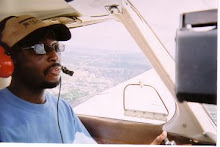
Continental Airlines honors its first black pilot by naming new 737 after him
A black pilot who fought all the way to the Supreme Court to be allowed to fly for a major airline had the rare distinction this week of having a Continental Airlines jet named in his honor.
Capt. Marlon Green was honored in a ceremony in Houston more than 50 years after he first approached Continental for a job. His six-year battle to fly for Continental ended with a 1963 Supreme Court ruling that forced airlines not to discriminate in their hiring.
"We turned him down for one reason and one reason only -- because of the color of his skin," Continental Chief Executive Jeff Smisek said in remarks as the airline unveiled its newest Boeing 737, a white jet with Green's name painted in navy blue near the nose. The other three Continental aircraft named after individuals honor former CEOs Larry Kellner, Gordon Bethune and Robert Fix.
Smisek acknowledged the airline's fight to keep Green out.
Smisek, also chairman and president, said he was "proud to be here today representing my 41,000 co-workers. But I tell you there is part of Continental's history of which I'm not proud. That happened over 50 years ago."
The trailblazing black pilot died last year at age 80. His brother, Jim Green, flew in from his home near Seattle for the ceremony Tuesday.
"He's looking down from heaven and saying well done -- a little bit late, but well done," Jim Green said in a report by the Houston Chronicle.
Green's fight to become a commercial airline pilot started in 1957 after he retired from the Air Force, where he flew more than 3,000 hours in multi-engine aircraft. He was rejected by every airline at which he applied, including Continental.
Continental granted him a flight test and interview only after he declined to note his race on his application. But the airline refused to hire him while hiring other less qualified applicants -- the basis of Green's legal challenge.
In 1963, the Supreme Court ruled that no one applying for a pilot's position could be denied a job on the basis of race. Green began flying for Continental in 1965. He remained with the company for 14 years.
"Capt. Green was a pioneer who was willing to challenge the unacceptable status quo of the time and paved the way for the most qualified applicants to be hired, regardless of the color of their skin," Smisek said.
Continental said minorities today account for more than 40 percent of its domestic workforce. Among its 4,310 pilots, 272, or 6 percent, are minorities, the company said.
At the Houston ceremony, Continental announced that Capt. Ray-Sean Silvera has been promoted to assistant chief pilot, the first black aviator in Continental's ranks to achieve the high-ranking administrative position. Silvera had proposed the idea of naming a plane in honor of Marlon Green after learning of his death.
A black pilot who fought all the way to the Supreme Court to be allowed to fly for a major airline had the rare distinction this week of having a Continental Airlines jet named in his honor.
Capt. Marlon Green was honored in a ceremony in Houston more than 50 years after he first approached Continental for a job. His six-year battle to fly for Continental ended with a 1963 Supreme Court ruling that forced airlines not to discriminate in their hiring.
"We turned him down for one reason and one reason only -- because of the color of his skin," Continental Chief Executive Jeff Smisek said in remarks as the airline unveiled its newest Boeing 737, a white jet with Green's name painted in navy blue near the nose. The other three Continental aircraft named after individuals honor former CEOs Larry Kellner, Gordon Bethune and Robert Fix.
Smisek acknowledged the airline's fight to keep Green out.
Smisek, also chairman and president, said he was "proud to be here today representing my 41,000 co-workers. But I tell you there is part of Continental's history of which I'm not proud. That happened over 50 years ago."
The trailblazing black pilot died last year at age 80. His brother, Jim Green, flew in from his home near Seattle for the ceremony Tuesday.
"He's looking down from heaven and saying well done -- a little bit late, but well done," Jim Green said in a report by the Houston Chronicle.
Green's fight to become a commercial airline pilot started in 1957 after he retired from the Air Force, where he flew more than 3,000 hours in multi-engine aircraft. He was rejected by every airline at which he applied, including Continental.
Continental granted him a flight test and interview only after he declined to note his race on his application. But the airline refused to hire him while hiring other less qualified applicants -- the basis of Green's legal challenge.
In 1963, the Supreme Court ruled that no one applying for a pilot's position could be denied a job on the basis of race. Green began flying for Continental in 1965. He remained with the company for 14 years.
"Capt. Green was a pioneer who was willing to challenge the unacceptable status quo of the time and paved the way for the most qualified applicants to be hired, regardless of the color of their skin," Smisek said.
Continental said minorities today account for more than 40 percent of its domestic workforce. Among its 4,310 pilots, 272, or 6 percent, are minorities, the company said.
At the Houston ceremony, Continental announced that Capt. Ray-Sean Silvera has been promoted to assistant chief pilot, the first black aviator in Continental's ranks to achieve the high-ranking administrative position. Silvera had proposed the idea of naming a plane in honor of Marlon Green after learning of his death.


No comments:
Post a Comment